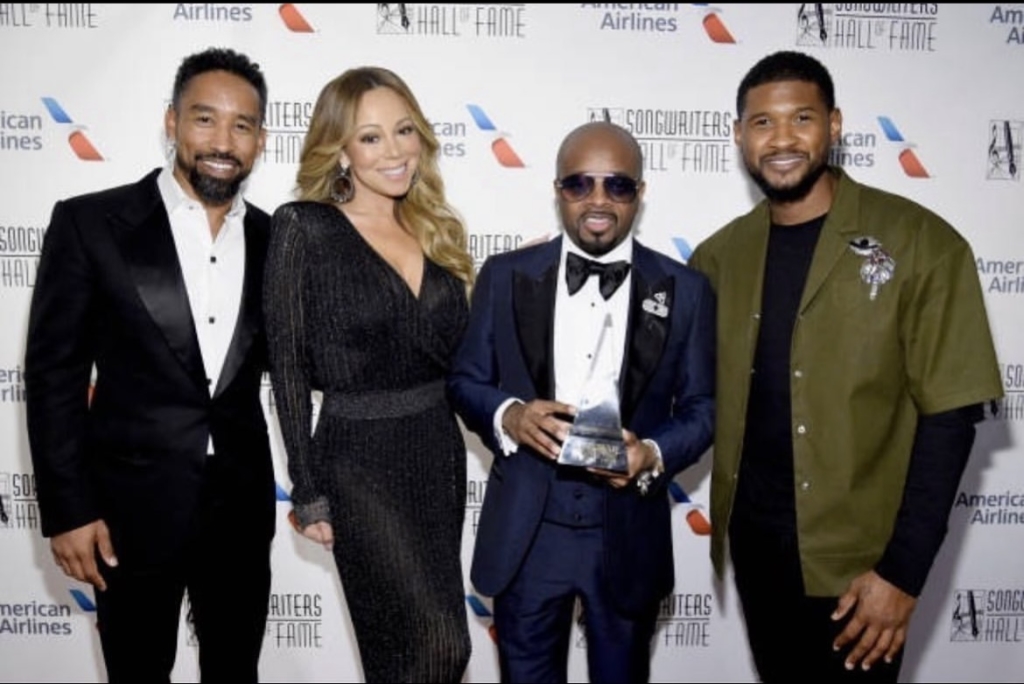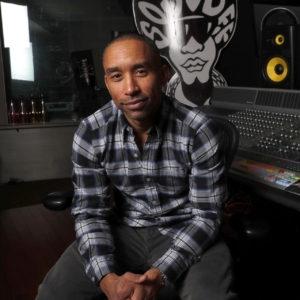
Johntá Austin, left, poses with Mariah Carey, Jermaine Dupri, and Usher at the 2018 Songwriters Hall of Fame for which Dupri was nominated. Courtesy photo
If it was your name called at the Grammy Awards for Best R&B song, do you know what your speech would be?
Johntá Austin, a 2022 Best & Brightest EMBA honoree, has an idea. The Atlanta native has two Grammy-winning songs, in fact — one with Mariah Carey and one with Mary J. Blige. “We Belong Together” was one of four songs Austin wrote with Mariah for her 10th studio album, “The Emancipation of Mimi,” and nabbed the acclaimed songwriter his first Grammy in 2005. Billboard later named it the song of the decade.
Austin, an Atlanta native, founded his company, Austin Entertainment Enterprises Inc., in 1995. He’s now working on an album with another artist you’ve definitely heard of, and will finish his executive MBA at University of North Carolina’s Kenan-Flagler Business School in October.
‘YOU HAVE TO ADAPT OR PERISH’
Austin isn’t the typical EMBA profile, if there is such a thing. After scoring his first songwriting credit in high school, he skipped college to begin what would become an acclaimed career in the music industry. But after nearly three decades, he started thinking about business school when he saw the landscape changing around him.
“To describe it, I’m gonna use something that I’ve learned in business school: There are changes in business, disruptions that go on in any market, and then there’s a transition. You have to adapt or perish,” Austin tells Poets&Quants.
“At the time, I didn’t know that I was working to make sure that I didn’t become Sears. I just wanted to be able to understand the landscape and how to better use my creative input as the business transitioned.”

Johntá Austin
P&Q recently spoke with Austin about his music career, applying for B-school without undergrad credentials, and that Grammy speech he thought about but didn’t actually get to deliver. Our conversation has been edited for length and clarity. Read more about Austin in his Best & Brightest EMBA profile.
Where did you grow up, and when did you first become interested in music?
I’m from Atlanta, born and raised, one of the few now as most of Atlanta is a kind of transplant city. My background in music started early. Socially, my godmother was really into the Motown sound, and so she introduced me to music; My grandfather was a pastor, and I would sing in his church.
Professionally, though, my older brother is a songwriter and producer, and he encouraged me to write songs. I started as a singer and an artist, and I had a record deal at a very early age, but that didn’t quite pan out. Meanwhile, my brother was giving me the encouragement and the space to take an interest in songwriting. I started with that around 14 or 15.
Oh, interesting. If you had the choice, do you think you would rather have been an artist or a songwriter? Or are you pretty comfortable with how your career turned out?
You know, I think about that often. I was actually telling the story in our storytelling class at Kenan-Flagler. I was friends with a guy who goes by the name of Usher (you may have heard of him). We got our deals around the same time. His success and his trajectory showed me that fame on his level was probably not going to look like that for me. In hindsight, it’s easy to say I’ve always wanted to be the songwriter, but honestly, looking back on it, the level of work and scrutiny that goes into being a famous and successful artist, I actually prefer my side of things. While, at the same time, I admire everything that he’s been able to accomplish as well.
And have you written for Usher?
Yes, I have worked on a couple of albums for him. I’m working on his current project that he’s looking to release this fall, and I’ve also been consulting with him on his residency in Las Vegas. We’ve maintained our friendship going on almost 30 years now.
Did you meet him in the business, so to speak, or did you hang in the same circles?
Well, a little bit of both. We met in the business; We had the same vocal coach early and, as young artists and both of us being from Atlanta, we were getting record deals at the same time. He was signed to LaFace, and I was signed to RCA. Word gets around, and we were working with some of the same people. We met and hit it off, and the rest, as they say, is history.
Did you study music in undergrad?
No. I started writing, and I was fortunate enough to have my first songwriting placement when I was still in high school. Then I got a few more placements as far as songs written for other artists, so I was already in the workforce from high school and stayed in it. I actually never attended undergrad, which was one of the things that attracted me to Kenan-Flagler. When I did my research, they were one of the programs that was willing to at least speak to me without an undergraduate degree to see if there was something that I could bring to the program as a professional who had been in the workforce for about 25 years.
Your credits are pretty extensive at this point in the business. What are some of the highlights that most stand out for you?
The first, I would say, is my first placement at 15. It was for a soundtrack for a Wayans brothers’ comedy movie. At 17, I had my first Top 10 record with Tyrese Gibson called “Sweet Lady.” I think I was 19 when I had my first No. 1 record.
And then just the space between 2005 to 2007, that body of work with Mariah Carey and Mary J. Blige, was definitely a huge highlight in my career, especially with Mariah. I remember having an opportunity to work with Mariah or another artist who was really really big at the time — I don’t want to say the name — but I felt like Mariah was the better choice even though she was coming off what for her was not a really big commercial success. The movie that she was in did not get good reviews and people had written Mariah off. I remember my music publisher at the time telling me I was crazy for working with Mariah. But I decided to go that route, and that produced the record and my first Grammy. I think working with Mariah led to the work with Mary J. Blige as well, which then led to my second Grammy.
What is Mariah like to work with? Is she really involved in the co-writing?
Yes. 100%. We ended up working on five records; four for the original release and then one for the repackage. She collaborated heavily every step of the way for all of the records. She is definitely an integral part of her creative process. She knows what she wants, and she’s a brilliant writer.
Is she different from her public persona?
At least over the last couple of years, I think she’s let people in a little to see that she’s extremely down to earth. Mariah is very funny, which I don’t know if people would pick that up immediately. She and I hit it off because we love some of the same movies and she, like me, talks in movie quotations. It probably sounds like a cliche, but part of her being down to earth is that she actually has a great sense of humor, and she’s very funny.
What is your process like when working with someone of that caliber?
It’s similar to my process when working with other artists. I will say that Mariah is a night owl, so she doesn’t really like to start sessions until like midnight. But she’s a hard worker. So that was really the only adjustment: Working with Mariah, you gotta adjust your sleep schedule. Other than that, we’re throwing out ideas, music is playing; I’ll throw out a line, she’ll throw out a line. It’s a very collaborative process, but we are similar in our processes.
What’s it like to hear your name called for a Grammy?
I mean, it’s great. I imagine, you know, if you’re a young athlete, you grow up practicing your Game 7 final shot or your final at bat or whatever. As a musician and songwriter, you grow up thinking about being nominated for a Grammy. It’s something that you set for yourself and you hope that it happens.
Obviously, when that moment comes, you’re still, I guess, a bit shocked. For Mariah’s “We Belong Together,” the Grammy category was in the pre-telecast, so I was actually in the car on the way to the award show. My publicist calls, I see her number pop up, and I’m like, “tell me!” And she’s like, “You’re a Grammy award winner.” So, I called my mom, and my parents were both on standby, and I just said, “Mom, your son won a Grammy.”
That’s so great. If you had gotten to give a speech, what would you have said?
I am a huge believer in faith. So obviously, I would thank God for everything and, you know, my family, Mariah, and our other collaborators like Jermaine Dupri. I would have kept it short and sweet.
When you hear that song, or any of your other milestone songs, out in the world, do you still get excited?
Oh, absolutely. You never get tired of hearing your songs. Your ears perk up for a quick second, then you kind of point it out if you’re with someone. I mean, it’s always good.
NEXT PAGE: Going back to school + A music industry pivot





Questions about this article? Email us or leave a comment below.